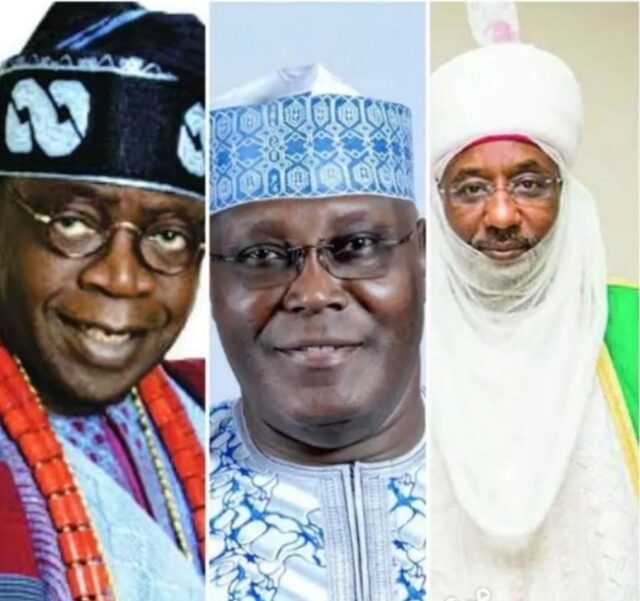
As the debate over the reality of the 2023 general election increases, with worsening insecurity in almost all parts of the country, KUNLE ODEREMI and SUNDAY ADEPOJU look at some underlining issues that may come to play as well as e-voting innovation.
The Independent National Electoral Commission (INEC) jolted the world at the dawn of the 2015 general election. The commission announced the postponement of a crucial election, the fourth since 1999, with the then INEC chairman, Professor Attahiru Jega, justifying the action on security issues. “INEC not being a security agency that could, by itself, guarantee protection for personnel and materials as well as voters during elections, the commission cannot lightly wave off the advice by the nation’s security chiefs. The commission is specifically concerned about the security of our ad hoc staff who constitute at least 600,000 young men and women, together with our regular staff, voters, election observers as well as election materials painstakingly acquired over the last one and half years. This concern is limited not just to the areas in the North-eastern part of Nigeria experiencing insurgency; the risk of deploying the personnel and calling people to exercise their democratic rights in a situation where their security cannot be guaranteed is a most onerous responsibility. Under such circumstances, few Election Monitoring Bodies (EMBs) across the world, if any, would contemplate proceeding with the elections as scheduled. No matter the extent of INEC’s preparedness, therefore, if the security of personnel, voters, election observers and election materials cannot be guaranteed, the life of innocent young men and women as well as the prospects of free, fair, credible and peaceful elections would be greatly jeopardised,” Jega asserted.
A number of bewildered stakeholders and the world expressed indignation over the sudden postponement of the poll, the fifth since the restoration of civil rule in the country. But the realities on ground had apparently made it a fait accompli. Ruthless insurgents in the North-East had left thousands killed, others maimed and many turned into widows and widowers, just as children were orphaned, as Internally Displaced (IDP) camps burst with thousands fled from rampaging Boko Haram attacks, rendering people homeless.
The global tracking of casualties in insurgency attacks in Nigeria was then about 10, 849 lives, with 244, 000 displaced. Links between Boko Haram and other fundamentalist groups compounded the threat to stability and political integrity of the nation. The impact of the terror attacks spread to other parts of the country and rose in the scale of casualties.
More than six years after, the security situation has taken new dimensions, even though one of the promises that heralded a leadership change and configuration after the elections was to eliminate the scourge. Despite changes in the leadership of the security architecture and retooling of the system at different times, hardened criminals have almost eroded the sanctity of life. Bandits still lay siege to many places; kidnappers and abductors collect ransoms and even kill some of their victims after ransoms are paid, just as killer-herders have taken their battle to other parts of the country with the authorities seemingly overwhelmed. Well-meaning statesmen, including traditional rulers, former Nigerian leaders, clerics, security experts and other concerned citizens stakeholders have expressed deep concerns, triggered conversation and proactive moves to tickle the authorities on the looming danger.
The seeming lack of capacity by the machinery of government to tame the criminals has led to curious initiatives such as self-help and self-defence, regional security outfits, hiring of foreign mercenaries advocacy, and above all, the campaign for self-determination by sundry groups. A scary report lately alleged the arrest of about 400 businessmen said to be funneling funds to Boko Haram insurgents and bandits. According to the report which the authorities are yet to refute, the arrest of the businessmen was made possible through an operation being coordinated by the Defence Intelligence Agency (DIA), and in collaboration with the Department of State Services (DSS), Nigerian Financial Intelligence Unit (NFIU) and the Central Bank of Nigeria (CBN), with the ring consisting bureau de change (BDC) operators, gold miners and sellers, and other businessmen is being acted upon. They were reportedly arrested in Kano, Borno, Abuja, Lagos, Sokoto, Adamawa, Kaduna and Zamfara. In the face of the stark contemporary realities, some individuals and groups are expressing fears about the fate of the 2023 general election despite the fact that it about one and half years away. From the opposition parties to civil society organisations, as well as state actors, the preponderance of such apprehension is spreading.
Landmines
According to a cross section of Nigerian leaders, there are some potential landmines as the journey to the 2023 elections progresses. Governor Samuel Ortom, Mallam Tanko Yakassai, Chief Supo Shoinare and other concerned stakeholders identified a few of those possible obstacles. For instance, Yakassai believed the state of insecurity poses a major threat, coupled with the absence of ideologically founded political parties. Ortom also expressed concern that insecurity constitutes an albatross, just as Chief Shonibare contended that the authorities are playing the ostrich in the face of threats to national unity and the National Question. Other perceived clogs include laissez-faire attitude towards electoral reforms such that two decades after the return to civil rule, the nation has been going through a vicious circle on the issue, power shift; lack of commitment to serious institutional reforms in relation to devolution of powers and political restructuring.
There are issues of youth restiveness due to a large scale of unemployment; insurgency, lethargic legislature occasioned by inappropriate recruitment process and procedure; ethno-religious discord, rising cases of violent attack by militia on security facilities, grinding poverty resulting from worsening economic indices, rascality of the elite, be it political and business, unbridled corruption and subversion of due process by parties. And with gunmen launching multiple attacks on security facilities in the South-East and South-South, the Senate has joined some eminent citizens in raising the alarm over the rising threats to the unity of the country.
Public perception
The experience of Ortom on the scale of insecurity puts him in a better position to gauge public pulse on the implications for the 2023 elections. He said the fate of the general election appears to be hanging in the balance due to security issues. He said: “I want to let Nigerians know, especially those who are responsible for making inflammatory statements; we are sitting on a keg of gunpowder. Everybody is not, in doubt, in Nigeria today about the security situation and without security, there can be no meaningful progress. He gave an antidote to the crisis: “I want to also appeal to Nigerians, 2023 is not far, but it’s still a long way. If we secure our country and everything is working fine, then we can talk about 2023, but the way things are going, if we don’t secure the country, there is no way we can be talking about 2023.
A former presidential spokesperson, Dr Doyin Okupe, also expressed serious concern over the general election, describing it as a grand political illusion. He said the grim reality is underscored by Increasing and widespread national insecurity and growing popular demands and sustained agitations for self-rule, pervasive and palpable inter-ethnic hatred. He added that these factors had assumed a significant and commanding stature in the polity such that they had become pre-eminent over all other national concerns. “Governments, political leaders, stakeholders, traditional institutions and well-meaning Nigerians must, at this point in time, stop everything else and pay due and urgent attention to finding quick solutions to these pressing issues before the consequences of failure to address them consume the entire nation.
A coalition of more than 70 civil society organisations, the Nigeria Civil Society Situation Room (NCSR) shared the concern of the elders on the fate of the 2023 elections. Co-conveners of NCSR: Ene Obi, Asma’Joda and James Ugochukwu, claimed in a statement that, “The security situation in Nigeria is deteriorating and manifesting in the form of banditry and kidnapping, posing a major threat for the 2023 general election. It calls on the Federal Government to take immediate and effective steps and action to improve public safety and security as well as reassure vulnerable communities of credible measures of their protection.”
Electronic voting
In the bid to reduce case of electoral malpractices, the INEC said it was poised to adopt e-voting in 2023. This is because election circles in the country had hitherto been largely characterised by missing names of some voters, intimidation and disenfranchisement, of voters, multiple and underage voting, snatching and destruction of ballot boxes and other materials, wrong computation and falsification of results, among others. These factors had, in a way, eroded people’s trust and confidence. However, the proposed plan by the commission on e-voting triggered an intense debate due to the state of infrastructure in the country, coupled with the low public awareness for such a modern technology and innovation. In a simple term, e-voting, is about a registered voter submitting a ballot using electronic means, instead of mailing in a piece of paper or going to a polling place. Generally, voters view their options on a computer screen and make their selections, much like taking an online survey. It involves electronic means to either aid or take care of casting and counting of votes. Experts have looked beyond the pros of the innovation and affirmed that e-voting system has a number of challenges, including vulnerability to hacking, susceptibility to fraud, malicious software programming, physical security of machines, unsuitability for a place with high rate of illiteracy, the infrastructure needed for its smooth running like electricity and stable internet service, secure storage of cast votes.
The e-voting has been a huge success in many first world countries, compared to their third world counterparts. In Africa, some countries have adopted the system and it has worked well; for instance, in South Africa and Ghana. And the INEC has stated its commitment to adopting the model in the November 6, 2021 governorship election in Anambra State. Specifically, INEC national commissioner, Mr Festus Okoye explained, rising from the challenges posed by the COVID-19 pandemic, the election would be used to pilot-test e-voting ahead the 2023 election. He, however, pointed that some areas of the electoral laws must be altered.
Okoye explained: “We have variously done pilot electronic collation and transmission of results. But we cannot proceed with some of these things because they have not been backed by law. We are also concluding arrangements on the use of electronic voting machine for our various elections. We have made it very clear for the Nigerian public that in the Anambra State governorship election that is coming up in 2021, we are determined to deploy electronic voting machines (EVMs) for the election.
Among other areas, the current bill in the National Assembly seeking an amendment of the country’s Electoral Act, is intended put the much talked about e-voting with legal framework for its take off in the coming elections. The Electoral Reform Bill, according Professor Yakubu, is to allow for full deployment of technology in elections, saying “it is our hope that the 2019 general elections will be the last generally manual elections.” He stated this at the opening of a two-day retreat with the National Assembly in Lagos with supports from the European Union Centre for Electoral Systems (ECES) and the International Foundation for Electoral Systems (IFES). He said, “Already, the commission has an electronic register of voters. Similarly, voter accreditation has also gone electronic. It is time for a new legislation to remove all encumbrances to further the deployment of technology in the electoral process, especially in the accreditation of voters and transmission of election results.”
According to the INEC chairman, there are 26 Clauses in the Bill that seeks to amend in several sections of the Electoral Act, ranging from the neutrality of electoral officials; compilation, display and storage of the voters’ registers; legal recognition for electronic accreditation of voters; party primaries and the nomination of candidates for elective offices by political parties; and a new provision to address the recurrence of the Kogi conundrum where a governorship candidate died between the commencement of polls and the declaration of winner, a situation not envisaged and clearly without any legal remedy under the constitution, the Electoral Act or even the commission’s regulations and guidelines.” It would be recalled that the 8th National Assembly was able to amend 41 clauses of the Electoral Act 2010.
Quick fix
Even, with the innovation of the e-voting and planned expansion of polling units; electoral reforms, interface with all relevant technical partners, National Assembly, political parties, among other major stakeholders, many have proffered possible way forward. Governor Ortom suggesting quick action to fix security or the poll is jinxed. On his part, seasoned politician, Alhaji Yakassai, canvassed an inclusive summit on security that should involve all stakeholders regardless of party affiliations. But, he warned that the duration of the summit two months and the implementation of the recommendations should be altruistic. According to him, the action has to be expedient and decisive before politicians jump the gun ahead the blast of the whistle for the 2023 elections.
The article was first published by the Nigerian Tribune Newspaper










